15-16 May 2021
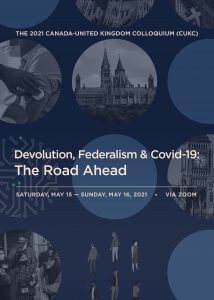
JOIN US FOR THE LAUNCH OF CUKC 2021 FINAL REPORT: SEPTEMBER 17,12 PM (EDT)
READ THE FINAL REPORT FOR CUKC 2021
VIEW THE PROGRAMME FOR CUKC 2021
In both Canada and the UK, the Covid-19 pandemic has exposed vulnerabilities related to governance structures. The virus knows no boundaries, yet the response has required policy coordination and resource management between different jurisdictions:
For Canada, these challenges have arisen within a reasonably settled polity. Devolution of powers from Westminster, however, has been piecemeal over the last 20 years, with many unresolved questions, not least about the impact of the various settlements upon the UK as a whole.
As the UK faces these challenges it is worth considering whether there are lessons it can learn from the Canadian experience with federalism – though it should be observed that, unlike Canadian federalism, UK devolution is theoretically reversible. The devolved institutions are products of laws enacted in Westminster.
The 2021 Canada-UK colloquium will bring together political representatives, academics, policy makers, business leaders and civil society in both countries to discuss the past, present and future of devolution and federalism in Canada and the UK. Special attention will be paid to lessons learned from COVID19 and digital transformation, as well as challenges and opportunities presented for example by Brexit, climate change and immigration.
21-22 November 2020
Read the full report in English and French
22-24 November 2019
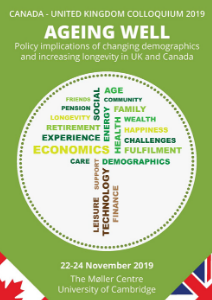
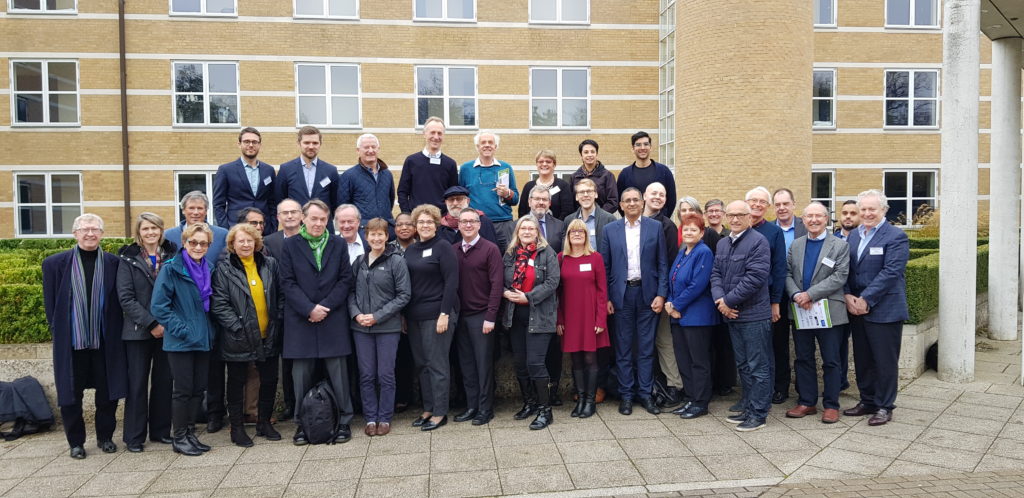
Photo credit: Dr Tina Park
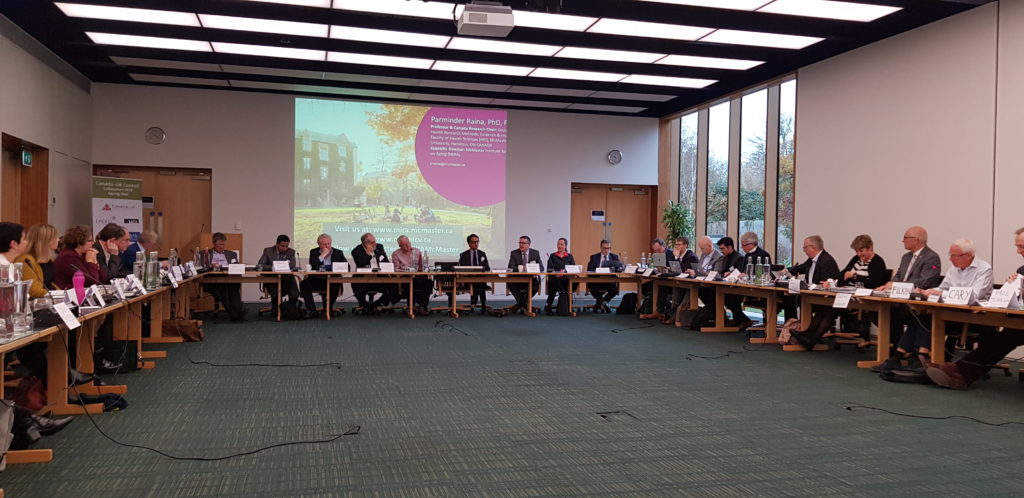
CUKC session a Moller Centre
The question of how we respond to the shift towards longer, healthier lives and larger populations of older people is urgent and important. The trends are similar in both countries, and there was much to learn from one another about how best to respond.
2019 CUKC participant John Ibbitson published an op-ed in The Globe and Mail: Older, longer: The super-aging of Canadians has taken everyone by surprise (January 2020)
23-25 November 2018


Photo credit: Milan Ilnyckyj

Left to right: Prof. Randall Hansen (Interim Director of the Munk School of Global Affairs and Public Policy), Dr. Mel Cappe (Munk School of Global Affairs and Public Policy), Kevin McGurgan (British Consul General), Dr. Alan Bernstein (CUKC Presiding Chair) and Dr. Tina Clark (CUKC Project Manager) Photo credit: Milan Ilnyckyj,
The 2018 Canada-UK Colloquium (CUKC) on “Artificial Intelligence & Society: Choices, Risks & Opportunities” will take place at the Munk School of Global Affairs and Public Policy at the University of Toronto from November 23 to 25, 2018.
Established in 1971, the Canada-UK Colloquium is an annual forum aimed at facilitating in-depth discussion of critical and timely public policy issues for both countries. Every year, it brings together some fifty Canadian and British parliamentarians, senior-level public servants, academics, journalists, business leaders and young scholars, to foster practical knowledge-sharing and encourage constructive collaboration. The location of the Colloquia rotates between the two countries each year. Over the past four decades, the CUKC has been widely endorsed by the Prime Ministers from both countries, and the Foreign and Commonwealth Office in the United Kingdom and the Department of Global Affairs Canada have actively supported this initiative.
This year’s colloquium focuses on public policy implications of the AI revolution, both at individual and societal levels. Key topics to be examined include the development and application of Deep Learning, implications of big data and privacy, and the use of AI in defence, security and policing. Special attention will also be paid to science & AI, implications for the labour market and social inequality, legal liability, new regulations, and ethical considerations. Canada and the UK are already leaders in AI research and development, and the Colloquium will bring together top experts to discuss ways in which both governments could mitigate the risks associated with AI and maximize benefits of new technological developments.
Co-hosted by Munk School of Global Affairs and Public Policy & Massey College at the University of Toronto.
Co-sponsored by the Office of Vice President, International at the University of Toronto, Microsoft Canada, Public Safety Canada, Global Affairs Canada, McCord Travel Management, Innovation, Science and Economic Development Canada, Canadian Institute for Advanced Research.
2018 CUKC participant Andrée Gagnon (Head of corporate, external and legal affairs for Microsoft Canada) in Policy Options: ‘Canada needs comprehensive AI policy framework‘ (November 2018)
16-18 November 2017
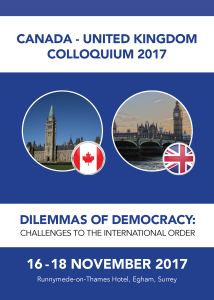
Follow the colloquium on Twitter with #CUKC2017
CUKC 2017 Report Launch in London in June 2018

Minister Karina Gould, Dr Mel Cappe (SPPG), UK High Commissioner Susan Jane le Jeune d’Allegeershecque, Dr. Tina J. Park, Minister Carolyn Bennett. 2017 Canada-UK Colloquium Report Launch Reception at Earnscliffe, British High Commission Residence.
About the 2017 Canada-UK Colloquium
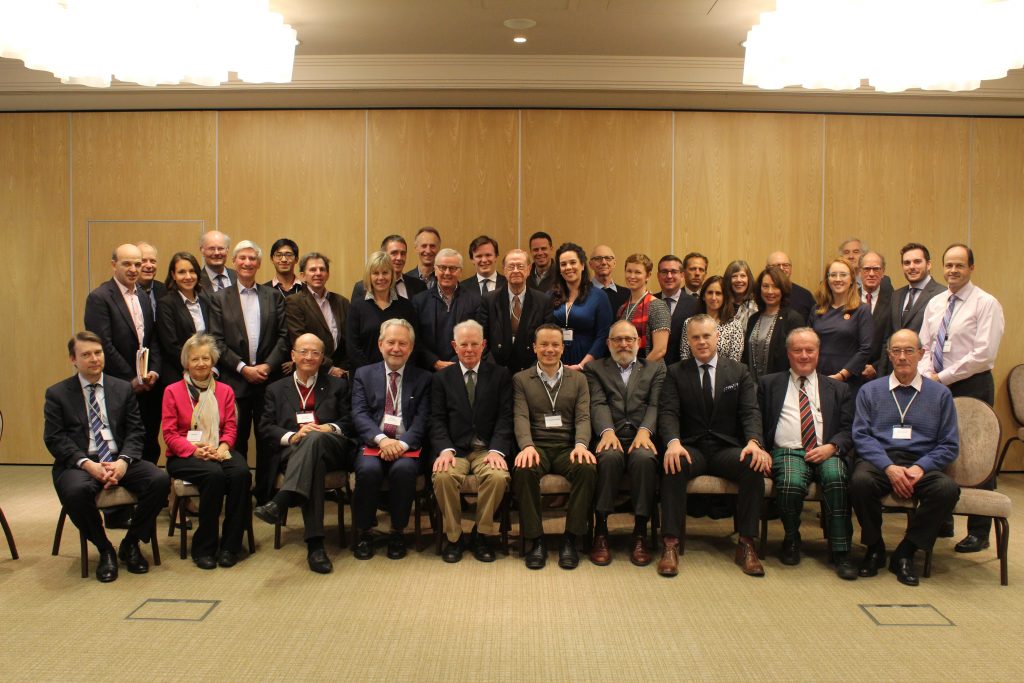
Photo credit CUKC
The 150th Anniversary of the British North America Act which established the Dominion of Canada is a good moment to reflect on the state of our respective democracies and the context in which they operate. Both nationally and internationally they are facing new challenges.
The international institutions created by the victorious powers after World War II including the UN, the World Bank, the IMF and what became the WTO, reflected confident assumptions about the desirability, universal applicability and gradual ascendancy of democracy; respect for human rights; open, rules-based relations between states; and ever-expanding free trade. The 1941 Atlantic Charter expressed Roosevelt and Churchill’s hope of a world in which all peoples could “choose the form of government under which they will live…in freedom from fear and want”.
The post-war international polity was never uncontested either in Britain or Canada. The 1970s was a notable period of economic nationalism in Canada, and there were lively disputes – for example about the EU in UK and about NAFTA in Canada. But the liberal direction of travel and the process of globalisation was broadly accepted, supported as it was by strong economic growth, technological development and rising standards of living. Confidence was reinforced by the collapse of the Soviet Union and liberal democratic advances from South America to Africa and Asia. Some even postulated ‘the end of history’.
More recently the global system has come under unprecedented strain. Economic growth has slowed, especially following the financial crash of 2008; technological change and offshoring have had bleak implications for low- and semi-skilled workers in the former industrial heartlands; Russia has upset the status quo in Crimea and Eastern Ukraine; China is challenging the Pax Americana in its neighbourhood; and the Iraq war (conducted in the name of ‘liberal internationalism’) was one catalyst in the violent disintegration of the state system in the Middle East, which has demonstrated both the incapacity and the vulnerability of the existing international order.
The election of President Trump exemplified a rise of populism, understood as a rejection of established politics and of self-perpetuating political and financial elites who are accused of managing a corrupt system for their own benefit, while patronising and ignoring the concerns of those who have been left behind, and who have lost hope that they can improve their lot within the existing system. There has been a widespread reaction against globalisation and multinational trade which are held responsible for growing inequality and the displacement of workers from traditional industries. The populist tide has been marked by growing intolerance and scapegoating of minorities (immigrants, Jews, Muslims); misogyny; and support for demagogic politicians offering simple, often ethno-nationalist, solutions.
These developments have shaken many assumptions about the future of world trade and the established international order, even calling into question what had been seen as the slow but inevitable ascendancy of core values such as freedom of speech and independent courts. The connection between liberalism and democracy appears to be fraying, with the election of a growing number of illiberal leaders. Did President Trump’s election represent a triumph of democracy, as Viktor Orban, the nationalist and socially conservative Prime Minister of Hungary characterised it (and as many characterised Brexit in the UK) or was it rather evidence of a crisis of democracy?
Do Canada and the UK’s democratic systems offer a solid bulwark against threats to our freedom, prosperity and security? Are they still the best framework for managing the many threats that we face? The answer, perhaps, is that while there is still an underlying confidence in democracy as “the least worst form of government”, there is disagreement and confusion about how far the forms of democracy practiced in the developed world are suitable for societies with long histories of autocracy; how radically our democracies need to adapt to the new challenges that we face; and how they can be protected from themselves.
One part of this relates to the balance between freedom and security. As modern technology increases the potential for accumulation and manipulation of mass data for purposes of surveillance, do liberal democracies end up attacking themselves in the name of liberty? Another relates to the threat posed to rational debate by social media with no legal duty or financial incentive to strive for truth, in which objective facts are less influential in shaping public opinion than appeals to emotion and personal prejudice.
But the new circumstances force us to confront even more fundamental dilemmas of democracy. How, for example, should societies protect themselves against the “tyranny of the majority” prioritising its interests over a significant minority to the point of oppressing them? The subject was much debated by the founding fathers in America, and by such writers as John Stuart Mill and Alexis de Tocqueville. The Canadian and British systems were both devised to entrench constitutional and legal protections.
Are these systems robust? The UK, in particular, seems to be seeing a drift from parliamentary to majoritarian rule. The turmoil engendered by the referendum of June 2016 partly reflected different understandings of the authority that should be accorded respectively to “the will of the people” as represented by a slender majority in a consultative referendum, and to the sovereignty of Parliament. When the High Court upheld Parliament’s right to be consulted about the triggering of the referendum decision, some newspapers went so far as to characterise the judges as “Enemies of the People”. Was this a direct challenge to the independence of the judiciary and the rule of law, or the healthy questioning of a complacent closed shop? Even in Canada the avowedly anti-populist Justin Trudeau observed that Canadians “deserve better” regarding the process for the appointment of Supreme Court judges.
Our established mechanisms of representative parliamentary democracy no longer inspire the trust and respect that they did, and there is increasing evidence of voter alienation, especially among the less educated, the poor and the young. Should MPs be expected to behave as role models, and should they endure the levels of public scrutiny to which they are subjected?
In Canada, there is renewed debate about how best to accommodate the rights and interests of indigenous people. Some would question the extent to which the First Nations should accept and engage with the settler parliamentary democracy that is Federal Canada.
In an effort to strengthen legitimacy, there have been moves towards devolution and decentralisation as well as increasing resort to different forms of direct democracy from national referendums to local action groups exploiting the potential of social media. Yet is further democratisation (involving regional Parliaments in the ratification of trade agreements for example, or electing Police Commissioners in the UK) an effective way to secure greater legitimacy and public support? And how do we protect our democracies against the abusive manipulation of social media to propagate falsehoods and to inflame hatred?
Some would contend that far from strengthening democracy, the experience of referendums has been to increase polarisation, dissatisfaction and the drift towards destructive populism. The more that people expect to be directly consulted about every decision that concerns them, the less – it would seem – do they defer to Parliament or other established structures, and the less can Governments inspire confidence that they control events or that they can get things done.
The conference will open with a review of the context in which this crisis of legitimacy has arisen. It will go on to examine some of the particular challenges faced by our democracies. What should be the limits upon ‘direct democracy’ and how can popular participation be channelled most effectively to constructive ends? How can we help to restore authority and respect to our Parliaments and other established institutions? How do we balance the competing wishes of international, national and sub-national majorities? What is the proper role of courts in our democracies?
24-26 November 2016
Fairmont Hotel MacDonald, Edmonton, Canada
In December 2015 the Paris Agreement was adopted by 196 governments at the 21st Conference of the Parties. It limits average global warming to 2°C above pre-industrial global temperatures—and seeks, as an aspirational target, to limiting warming to 1.5°C. The focus now shifts to the efforts of individual countries to make “nationally determined contributions” to the global effort. The 2016 Canada-UK Colloquium will focus on ways in which Canada and the United Kingdom could cooperate and learn from each other on achieving their “nationally determined contributions.” How does each national economy propose to manage the transition to a low-carbon economy in accordance with the ambitious timetables to which they are committed?
RECEPTION MARKING THE LAUNCH OF THE 2016 CANADA-U.K. COLLOQUIUM REPORT
“Transition to a low-carbon economy”
On 17 May 2017, the Canadian High Commissioner in London, Mrs Janice Charette, was delighted to host a large Reception at Canada House in London to mark the launch of the Canada-UK Colloquium’s Report on The Transition to a Low Carbon Economy.
A wide mix of guests attended the London launch which proved a big success. The main feature was a panel discussion by four specially invited speakers, followed by a series of penetrating questions to the panel from policy makers and experts in the industry. On the panel were The Rt Hon. John Gummer, Lord Deben, who is Chair of the UK’s independent Climate Change Committee, The Hon. Hugh Segal who is Master of Massey College in Toronto, Dame Fiona Woolf, a former Lord Mayor of the City of London and an expert on the electricity generating industry, and Mr Tim Nixon a senior executive at Thomson Reuters. The panellists drew attention to the rich and varied policy exchanges which took place between the British and Canadian delegates at the Colloquium, held last November in Edmonton and in which the Government of Alberta took a prominent part. Prominent in the discussion was the importance of promoting the “next stage ideas” set out in the Report’s recommendations relating to the carbon policy framework in each country.
This event was timed to coincide closely with an equivalent launch of the Report at Earnscliffe, the British High Commissioner’s residence in Ottawa, hosted by Mr. Howard Drake on 15 May 2017. The Ottawa launch brought together over 65 attendees from federal government, academia, business community, and civil society. Mr. Howard Drake, the Hon. Catherine McKenna, Minister of Climate Change and Environment, the Hon. Carolyn Bennett, Minister of Indigenous and Northern Affairs, and Dr. Mel Cappe, co-chair of the Canada-UK colloquium and professor of the School of Public Policy and Governance at the University of Toronto, delivered short remarks.
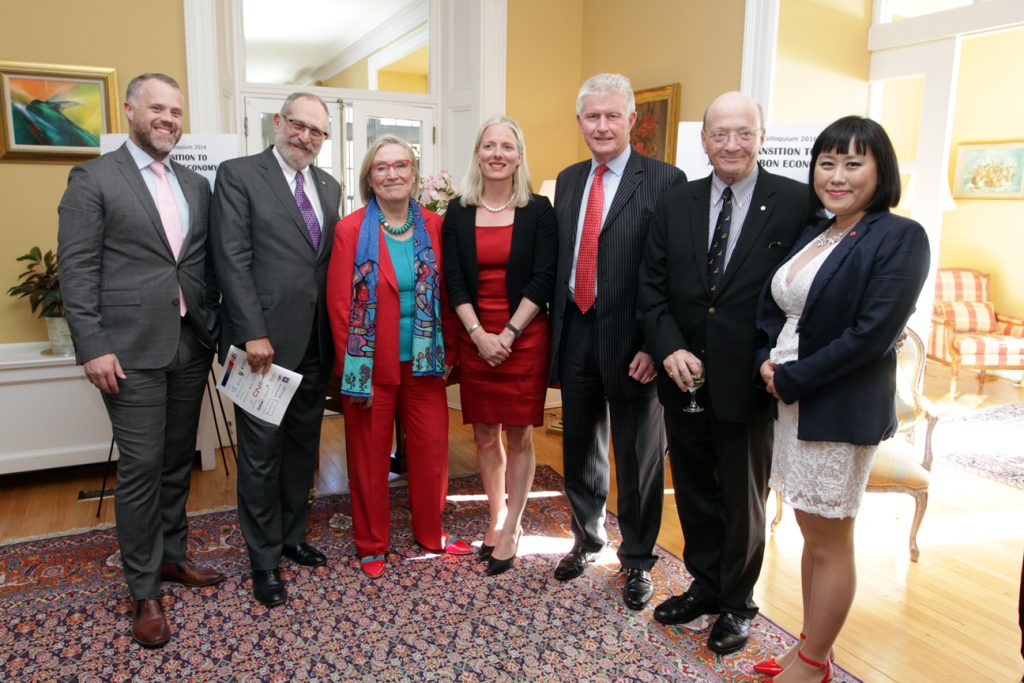
(From Left to Right: Prof. Peter Loewen, Prof. Mel Cappe, the Hon. Carolyn Bennett, the Hon. Catherine McKenna, Mr. Howard Drake, the Hon. Hugh Segal, Tina Park) Photo credit: Sam Garcia
2016 Canada-UK Colloquium Report Launch Reception at Earnscliffe, British High Commission Residence